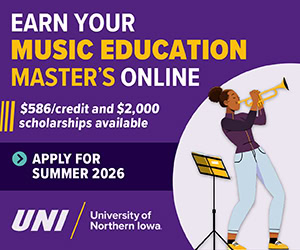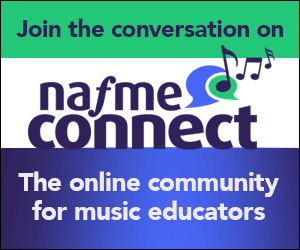MEMBER PROFILE
Ashleigh Lore
- Candidate for 2026–2028 NAfME North Central Division President-Elect

/ Membership / Meet Our Members / Ashleigh Lore
What do you see as the major challenges music education will face during your term and in what ways can you transform these into opportunities during your presidency?
During my term, I believe some of the hardest challenges facing our profession will be a reduction in programming due to budgetary cuts or adjustments to local, state, and federal funding. Having participated in multiple advocacy days meeting with state and federal legislators, I understand how important it is to share our message and to be at the forefront of stakeholders’ minds when choosing how arts funding will be supported. This extends far beyond the governmental and public sector (nonprofit) community, but also into the private sector (for profit) community.
I also have a strong understanding of how to solicit funding opportunities for a variety of programming needs, and wish to provide as many resources and assistance for the diverse North Central Division population as I can. Musicians are inherently creative, and we are often able to adapt to the environment in which we serve. Because of this ability to adapt, there is an opportunity for much of this creativity to be utilized to better strengthen understanding of the importance of music education for ALL in our communities, thereby encouraging the bolstering of continued or even new programming.
What do you see as the major challenges the association will face during your term and in what ways can you transform these into opportunities during your presidency?
I believe a lot of what we are seeing is a division of community, modeled much by current governmental administration(s). Many programs or opportunities are becoming localized or forced into a more singleton behavior, grasping at resources or opportunities, rather than collaboration with a whole community. The National Association for Music Education (NAfME) is no stranger to this behavior, having some states choose to remove themselves from affiliation with NAfME (including within the North Central Division).
Making the decision to separate from an overarching organization is significant, and it is my understanding that reasons have included: financial concerns, differing philosophies or governing ideals, etc. While these are legitimate concerns for all parties involved, I believe the things we need to focus on are the commonalities. Every state has their own set of strengths and challenges within their musical communities, so how can we better unify while still acknowledging these differences?
I understand and have experienced NAfME’s connections to my home state of Michigan, highlighting all of the wonderful programming NAfME offers, but feel that this information is not easy to navigate (or shared clearly) for all membership. Honestly, I did not know as much about NAfME until I spent more time garnering information as part of my state’s executive board, as well as attending the National Leadership Assembly. This information also sometimes feels as though it is a bit of a one-sided NAfME sharing, rather than listening to what is currently happening in states and relating this information at a national level.
I believe an important action item is to spend more time with states getting to know what is currently happening in a “grassroots” style of connecting. Some of the actionable things I would like to do is visit each state multiple times during the course of my tenure, both in person and via video conferencing, and learn about HOW they are developing current and future programming for their populations. This information can be key to unifying structures and learning what future music education planning and implementation will look like in the years to come.
How do you plan to advance equity/DEIA in NAfME during your term of office?
I think continued education in this area is key; for the NAfME community, stakeholders within our musical community groups, and for myself. I believe it is important to facilitate communities that respect inclusive environments, provide diverse curriculum and resources, and promote collaboration through representation. I am a firm believer that NAfME aligns with this vision, offering amazing resources including the NAfME Academy and Equity Resource Center, which provide pivotal opportunities to learn more about this continued work.
I also believe we need to continue to critically examine our societal structures for past and current history in order to help systemic change. No system is perfect, and especially with developing knowledge and technologies, we are at a pivotal time to create spaces where this work can be done. NAfME has a lot of good checks and balances set up to do this, and I would hope to help advocate for any changes or growth that needs to happen within the organization, or help others better develop their own structures.
Equity Statement
I am committed to continually evaluating and revising my own understanding of equity within the world of music education. I find it incredibly important to create space for the elevation of music as a tool for activism, education, and developing a sense of belonging within a community. I recognize privileges that have given me specific experiences that others may not have had, and through this acknowledgement hope to provide better support for music communities and my students.
I teach an incredibly diverse population; over five hundred students speaking more than twenty-five different languages, and many of whom are from other countries. I am able to directly see the impact of my teaching choices, and as I have learned more, have been able to make adjustments to curriculum that reflect and elevate more diverse communities to create a stronger equitable structure. When children can recognize themselves and what they know, they can pursue a deeper education into the unknown while feeling safe, valued, and respected.
Leadership Statement
I believe that educators who anticipate student and colleague needs produce more successful educational communities. This can be achieved by drawing from diverse resources, including interacting collaboratively with colleagues in a variety of settings, continuing to gain academic expertise, and working independently on educational goals. I have grown increasingly committed to active participation and leadership in professional organizations that promote knowledge in my field, including current appointment to the Michigan Music Education Association (MMEA) as their Treasurer, former President of the Mid-Michigan Orff-Schulwerk Association (MMOSA), a founding member of the International Orff-Schulwerk Forum Salzburg (IOSFS) Finance Committee, and participating as a Member-At-Large for the National Association for Music Education (NAfME) General Music Council. I enthusiastically attend varied professional development and networking opportunities, enjoy conducting independent research for presentation to fellow educators, and have proven myself as a prolific grant writer.
Between writing, editing, and advising others, I have earned millions in grant funding since 2013, and have summarized the process in my first published book, The Music Educator’s Guide to Grant Writing (2019). I have conducted multiple professional development workshops for educators, including presenting multiple times on behalf of Carnegie Hall, and am often a sought-after presenter on fine arts education-related topics. Additionally, I serve as an Adjunct Professor at Anderson University (IN) teaching a course called Grant Writing for the Music Educator. These experiences have not only helped to shape who I am as an educator, but they also allow me to help shape the future of music education on national and international levels.
I love teaching music and feel that it is an essential part of developing a child’s intellectual, emotional, and cultural growth. When interacting musically, especially at the younger grades, children learn when it is (and is not) appropriate to respond. They learn the rhythm of music, which closely mirrors the language we use to communicate. They learn how to blend rhythms together to create songs and dances with forms and patterns. They learn about people in other countries and historical eras, and how to readily communicate with cultures beyond their own. Essentially, children in the elementary music classroom are learning how to discover and express themselves in positive ways that require a combination of visual, auditory, and kinesthetic experiences. From these experiences, they are given opportunities to collaborate together: listening, analyzing, and reacting to the overall experience. And, in the end, this is how we bolster strong communities.


